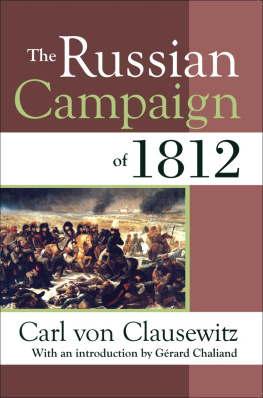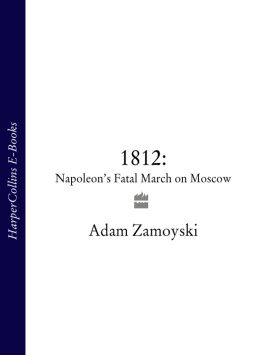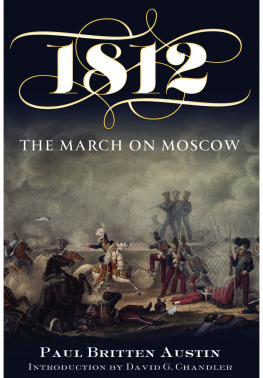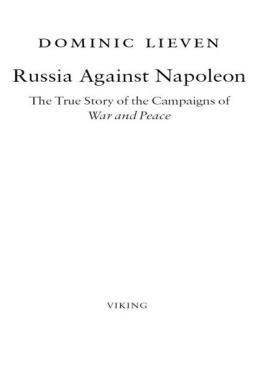Originally published in 1996 by the Blue Crane Books
Published 2007 by Transaction Publishers
Published 2017 by Routledge
2 Park Square, Milton Park, Abingdon, Oxon OX14 4RN
711 Third Avenue, New York, NY 10017, USA
Routledge is an imprint of the Taylor & Francis Group, an informa business
Copyright 2007 by Taylor &Francis.
All rights reserved. No part of this book may be reprinted or reproduced or utilised in any form or by any electronic, mechanical, or other means, now known or hereafter invented, including photocopying and recording, or in any information storage or retrieval system, without permission in writing from the publishers.
Notice:
Product or corporate names may be trademarks or registered trademarks, and are used only for identification and explanation without intent to infringe.
Library of Congress Catalog Number: 2006050052
Library of Congress Cataloging-in-publication Data
Clausewitz, Carl von, 1780-1831.
[Feldzug 1812 in Russland. English]
The Russian campaign of 1812 / Carl von Clausewitz ; with an introduction
by Grard Chaliand.
p.cm.
Originally published: The campaign of 1812 in Russia. Watertown, Mass. : Blue Crane Books, 1996.
Includes bibliographical references.
ISBN 1-4128-0599-6 (alk. paper) 1. Napoleonic Wars, 1800-1815CampaignsRussia. 2. Napoleonic Wars, 1800-1815Personal narratives, German. 3. Napoleon I, Emperor of the French, 1769-1821Contemporaries. 4. RussiaHistory, Military1801-1917. I. Title.
DC235.C6132 2006
940.2742dc22
2006050052
ISBN 13: 978-1-4128-0599-5 (pbk)
INTRODUCTION
CLAUSEWITZ IN RUSSIA
In the enormous oeuvre of Carl von Clausewitz, the best known work by far is the unfinished magnum opus On War. But his works include many excellent writings on military history of which The Campaign of 1812 in Russia is assuredly the masterpiece.
The Campaign of 1812 in Russia is the most serious source on that campaign. The sections dealing with Clausewitzs own activities were written shortly after the events themselves, probably in 1814-1815. The manuscript as it was found by his wife, Maria von Clausewitz, contained three parts; the second represented the story of the campaign itself. The first and third parts may have been intended to be part of another work. But Maria von Clausewitz decided to publish the work as it was, believing the three parts to be sections of a single plan.
In his historical writings, it is not so much the battles that Clausewitz stresses as the global analysis of conflict. This is particularly the case of his books devoted to 1812, 1813, and 1814. Thus, Clausewitz is more than a military historian in the traditional sense. His concrete and detached analysis, often born of an experience contemplated at leisure, makes him a complete historian capable of appreciating a situation in all its political, diplomatic, and military ramifications.
During his long military careerhe was eleven when he joined the cadet corpsCarl von Clausewitz (1780-1831) took part in wars three times: as a youth in 1793-1795; briefly in 1806, the year of the Prussian disaster at Jena; and, finally, uninterruptedly from 1812 to 1815, from the Russian campaign to Napoleons final fall.
Clausewitzs entire strictly military career was dominated by the giant who bestrode his time: Napoleon, the heir in his way of the French Revolution. It was a giant he fought, but a giant whom he admired and whose supremacy he never questioned.
Three features, apart from the qualities of the text themselves, make The Campaign of 1812 in Russia absorbing: the campaign marked the decisive turning point that led to the fall of the Napoleonic Empire. Carl von Clausewitz was present, as he was during the campaigns of 1813 and 1814, and it is as a participant observer that he delivers this document of (almost) instant military history. Finally, this campaign was crucial for Clausewitz and is so for those interested in him. It largely decided his fate. In 1812, driven by patriotismand, doubtless, one also could say nationalismthe Prussian Clausewitz, humiliated, along with a segment of the elite in the service of Prussia, by the defeats at Jena and Auerstadt, went over into the service of Russia. But this act was against the Franco-Prussian alliance to which King Friedrich Wilhelm had consented to save his dynasty. Clausewitz was regarded by the king as an insubordinate subjectnot as a patriot who had done more than his duty.
Jena was a disaster for Prussia. Her army, one of the most remarkable on the continent a few decades earlier under Frederick the Great but now arthritic, collapsed totally. Rarely was any battle so decisive in the sense that in one fell swoop it brought a state to its knees. The country was subject to Napoleons domination. But a handful of men devoted themselves tirelessly to reforming the Prussian army and gradually succeeded in imposing their views on the king of Prussia, Friedrich Wilhelm. Among these men were the great Gerhardt Scharnhorst, who was a Hanoverian; August Gneisenau, who was a Saxon and whose father had even served the emperor of Austria against Frederick II; and Carl von Clausewitz.
This reorganization, carried through after 1808 under the leadership of Scharnhorst, transformed the Prussian army into an instrument capable of waging the campaigns of 1813 and 1814 and taking part, under the command of Blcher, in the battle of Waterloo that put an end to the Napoleonic era. To put these campaigns in perspective, it might be mentioned that in the German-language literature the battles of 1813 that took place on German soil are referred to as wars of liberation.
Jena, to which Clausewitz devoted a merciless analysis twenty years later, was not only due to the sclerosis of the Prussian military machineexcessively slow movements; inadequate coordination between infantry, cavalry, and artillery; excessive numbers of services; and so on, but also to the conservatism of Prussian society.
The reforms proposed by the group working around Scharnhorst bore essentially (in addition to the strictly technical proposals) on three points:
1. introducing universal conscription (based on the French model);
2. ending the system whereby only members of the aristocracy could become officers; and
3. relaxing the existing discipline system and, especially, ending corporal punishment.
As for the idea that any deserving and capable soldier might be promoted to senior ranks, as in the French army, it ran up against opposition from the aristocrats, one of whose representatives went so far as to say to the king: If you agree to this reform, Sire, from where will you draw your legitimacy? But after some hesitation the king yielded on that point.
In fact, the reforms marked the political and social changeover from the wars of the 18th century fought by small professional armies engaged in limited battles to the wars of the 19th century based on conscription, the expression of the nation-state, and devastating confrontations. These military reforms completed the civil reforms introduced by Friedrich Karl, Baron von Stein, who held high administrative office for only fourteen months in 1807-1808. He signed the Edicts of Emancipation Suppressing Serfdom in Prussia (an institution already considerably weakened); every inhabitant of the Prussian state was authorized to acquire land, without limitation by the state. The peasant was on the way to becoming a citizen.













